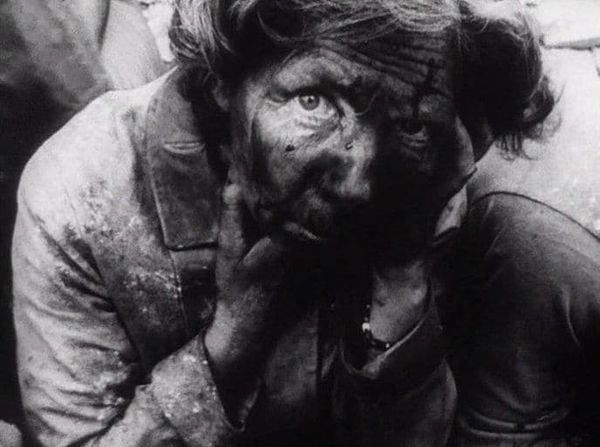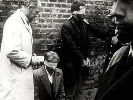Eye For Film >> Movies >> The War Game (1965) Film Review

In the Sixties the prospect of a nuclear war was very real and, though we choose to try to forget it these days, the possibility that someone, somewhere could set off a nuclear device is still a very real one. This means Peter Watkins' hard-hitting look at what could happen to Kent in the event of a nuclear bomb being detonated still carries a great deal of weight more than 30 years after he shot it.
The fact that this film still has a lot to say is perhaps just as well, considering that it was thought to be so gruelling and such a harsh expose of how completely inadequate Britain's defences were against a nuclear attack that it was banned for more than 20 years.

Shot in the 'Mr Chumley Warner' style of public information films of the time, the voice-over - provided by a very young Michael Aspel - talks about the number of potential nuclear targets in the UK before going on to take us step by step through what would happen in the event of a nuclear attack. Before getting down to the nitty-gritty, though, Watkins is careful to set the scene of ignorance regarding nuclear devices at the time - though it is doubtful whether someone asking a person on the street about Strontium 90 today would get a more intelligent response.
The fashions may have changed but the sentiment behind the documentary is as real today as it ever was. Throughout the documentary, too, Watkins is keen to remind us of the biggoted and ridiculous statements made by churchmen and statesmen at the time. "Our nuclear weapons will be used with wisdom," proclaims one as Watkins cuts to a firestorm showing the extent of the destruction.
The message is loud and clear. Nuclear war is not only deadly but messy and long-lasting, too, Watkins is begging the question "would the survivors envy the dead?" It is hard to know whether it is the powerful images such as a man carrying a bucket of wedding rings to try to identify those who had died are what got the film put on the 'do not touch' shelf for so long or whether the subject matter itself was enough. Certainly, the idea of policemen shooting the injured to put them out of their misery would have been incredibly shocking back then and it is still a vivid image today. There is nothing subtle about this documentary, no place for irony just shocking image after image to bring home the terror of war.
Watson fought to have his views on the war committed to celluloid and, then, fought all over again to have them shown to the public after the BBC found it didn't have the stomach for something so close to home in the mid-Sixties. Shortly after The War Game was banned, Watkins left the country and it is easy to see why, even though he had the last laugh when the film won the Oscar for the best documentary feature. Documentary-makers and artists may have revisited this territory in the Eighties with Threads and When the Wind Blows but The War Game still remains a startling testament to the fears that existed long before and, though we are now more inured to the violence of conflict, it is as chilling today as it ever was.
Reviewed on: 26 May 2007



















